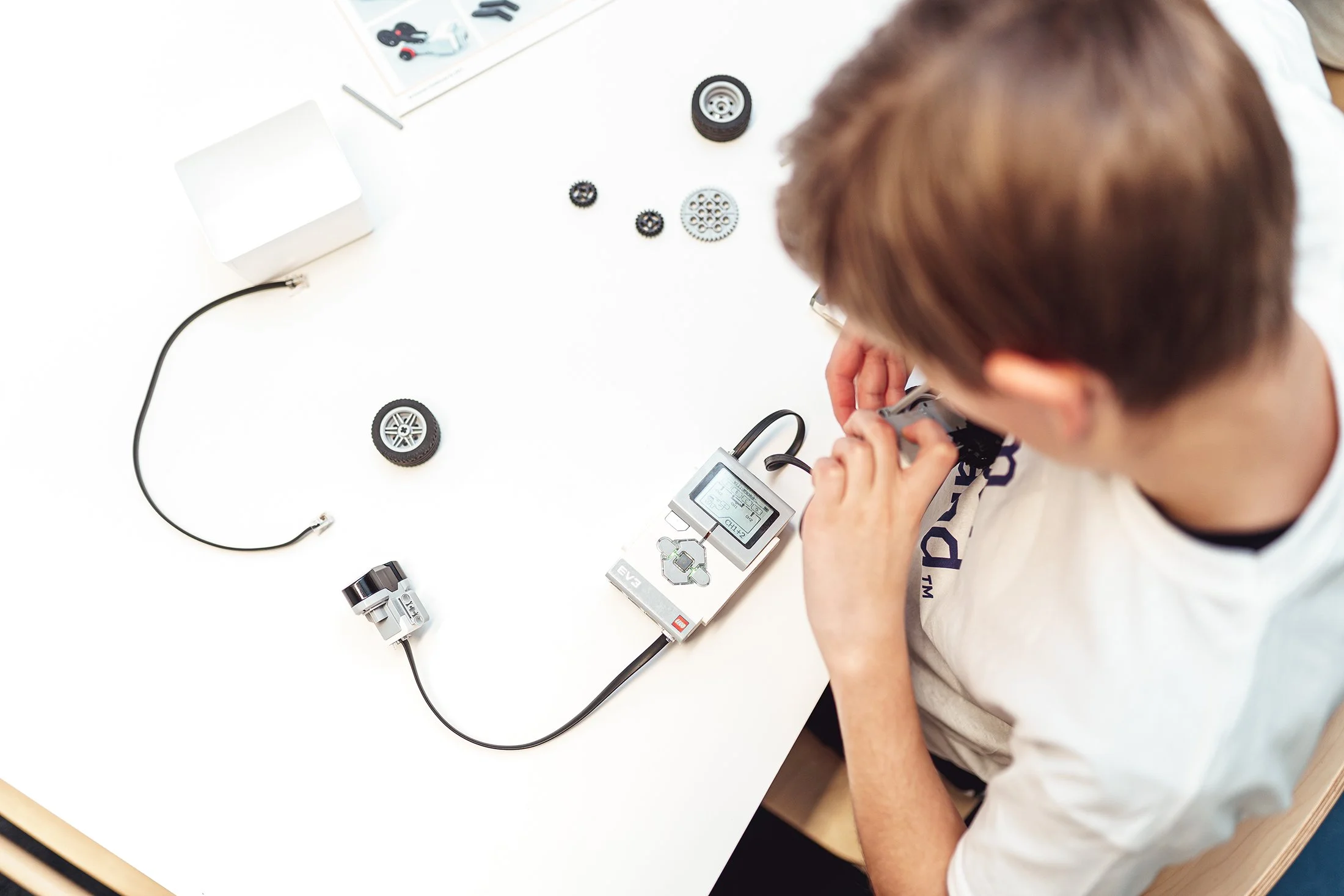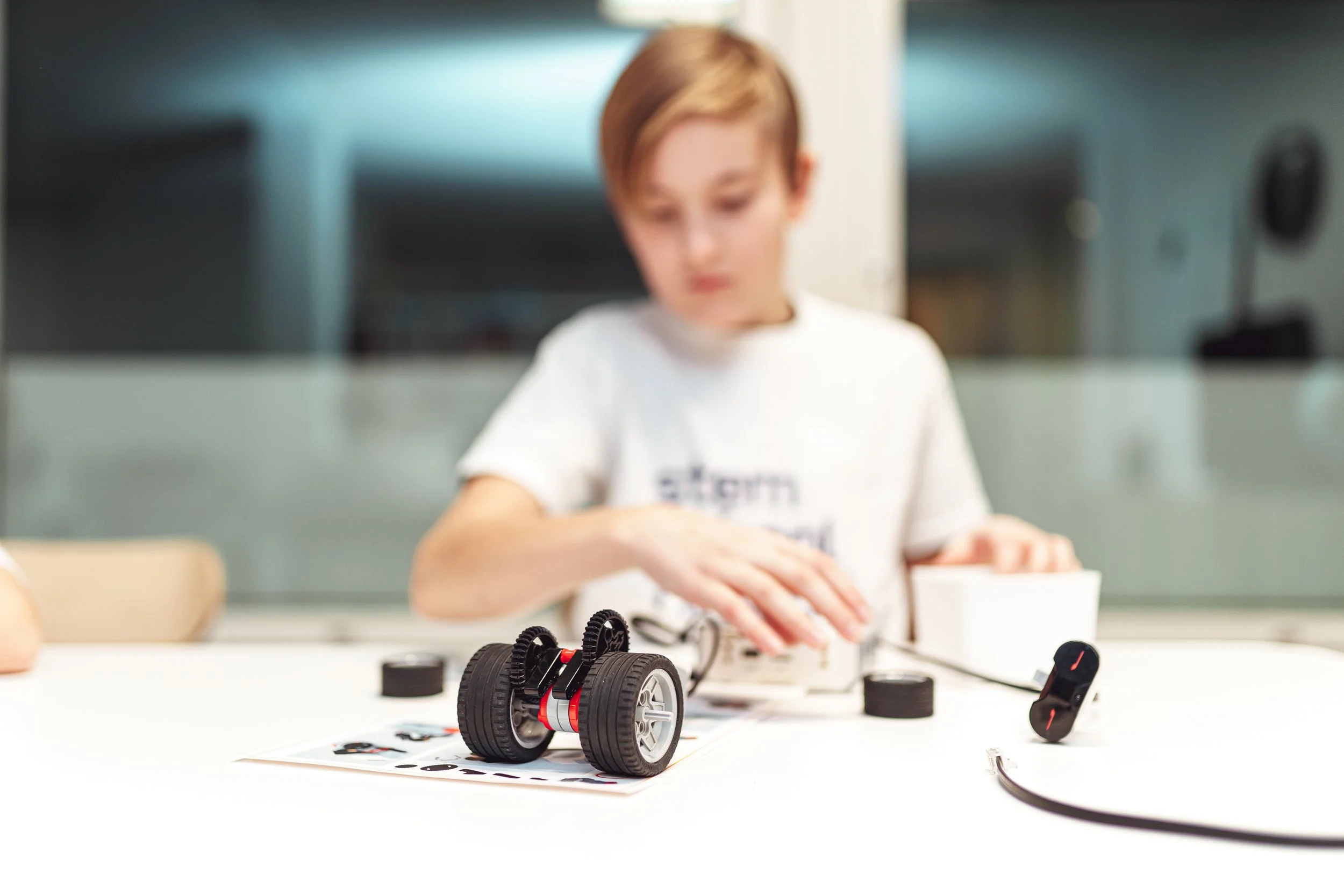Engineering
Miniengineering
-

Miniengineering 1
Extent:
2 semesters, 15 lessons per semester, each 60 minutes
Recommended age:
4 to 6 years
Description:
In Miniengineering 1 - module students learn the basics of simple mechanics and they are introduced to different non-complex mechanical structures and terms.
Learning objectives:
learn to build and combine different simple mechanical structures.
learn basic mechanical terminology and concepts.
learn abstract thinking and problem-solving.
understand basics of the physical phenomena in mechanical structures.
learn to make simple tests and observe.
learn to make up comparative and fair tests.
learn to identify and classify parts of mechanical structures.
Implementation:
Each lesson has its own theme. During each lesson there is a short theory of the theme. The goal is that each student learns the basics of the theme, terminology and theory, and is able to implement it in practice. Each theme includes hands-on working and exercises during which student is able to build the mechanisms and structures independently.
Equipment and materials:
Basic STEM lego set, digital/physical lesson plans and videos.
-

Miniengineering 2
Extent:
2 semesters, 15 lessons per semester, each 60 minutes
Recommended age:
4 to 6 years
Description:
In Miniengineering 2 - module student continues to learn the basics of simple mechanics and they learn to constructing combinations of different simple structures. Students will learn more mechanical terminology and learn independent problem-solving skills.
Learning objectives:
learn to build and combine different simple mechanical structures.
learn basic mechanical terminology and concepts.
learn abstract thinking and problem-solving.
understand basics of the physical phenomena in mechanical structures.
learn to make simple tests and observe.
learn to make up comparative and fair tests.
learn to identify and classify parts of mechanical structures.
Implementation:
Each lesson has its own theme. During each lesson there is a short theory of the theme. The goal is that each student learns the basics of the theme, terminology and theory, and is able to implement it in practice. Each theme includes hands-on working and exercises during which student is able to build the mechanisms and structures independently.
Equipment and materials:
Basic STEM lego set, digital/physical lesson plans and videos.
Engineering
-

Engineering 1
Extent:
2 semesters, 15 lessons per semester, each 60 minutes
Recommended age:
7 to 12 years
Description:
In Engineering 1 - module student learns the basics of mechanics. During this module students learn to build different mechanical basic structures, different mechanical systems and simple machines.
Learning objectives:
learn to build and combine different mechanical structures, machines and systems.
learn basic mechanical and physical terminology and concepts.
learn abstract thinking and problem-solving.
understand basics of the physical phenomena in mechanical structures.
learn to make analytical tests and observe.
learn to make up comparative and fair tests.
learn to identify and classify parts of mechanical structures, systems and parts.
Implementation:
Each lesson has its own theme. During each lesson there is a short theory of the theme. The goal is that each student learns the basics of the theme, terminology and theory, and is able to implement it in practice. Each theme includes hands-on working and exercises during which child is able to build the mechanisms and structures.
Equipment and materials:
Basic STEM lego set, digital/physical lesson plans and videos.
-

Engineering 2
Extent:
2 semesters, 15 lessons per semester, each 60 minutes
Recommended age:
7 to 12 years
Description:
In Engineering 2 - module student learns the basics of more advanced mechanics. During this module students learn to build, combine and implement different mechanical structures, different mechanical systems and simple machines.
Learning objectives:
learn to build, combine and implement different mechanical structures, machines and systems.
learn the basic of more complex mechanical structures.
learn mechanical and physical terminology and concepts.
learn abstract thinking and problem-solving.
understand basics of the physical phenomena in mechanical structures.
learn to make analytical tests and observe.
learn to make up comparative and fair tests.
learn to identify and classify parts of mechanical structures, systems and parts.
Implementation:
Each lesson has its own theme. During each lesson there is a short theory of the theme. The goal is that each student learns the basics of the theme, terminology and theory, and is able to implement it in practice. Each theme includes hands-on working and exercises during which child is able to build the mechanisms and structures.
Equipment and materials:
Basic STEM lego set, digital/physical lesson plans and videos.
-

Engineering 3
Extent:
2 semesters, 15 lessons per semester, each 60 minutes
Recommended age:
9 to 15 years
Description:
In Engineering 3 - module student learns more advanced mechanical structures and their applications. During this module students learn to build, combine and implement different complex mechanical structures and system and learns the basics of visual programming.
Learning objectives:
learn to build, combine and implement different complex mechanical structures, machines and systems
learn the basics of complex mechanical structures and their applications.
learn complex mechanical and physical terminology and concepts.
learn abstract thinking and problem-solving.
understand basics of the physical phenomena in complex mechanical structures.
learn the basics of visual programming.
Implementation:
Each lesson has its own theme. During each lesson there is a short theory of the theme. The goal is that each student learns the basics of the theme, terminology and theory, and is able to implement it in practice and in larger projects. Each theme includes hands-on working and exercises during which child is able to build complex mechanisms and structures.
Equipment and materials:
Advanced STEM lego set, digital/physical lesson plans and videos.
-

Engineering 4
Extent:
2 semesters, 15 lessons per semester, each 60 minutes
Recommended age:
9 to 15 years
Description:
Engineering 4 – module is an advanced module where students learn the basics of programming and electronics. In this module students integrate complex mechanical structures and programming. During this module students also learn the basics of IoT devices and programmable robotics,
Learning objectives:
learn to the basics of textual programming and electronics.
learn to build and program complex moving structures and machine parts.
learn to design and implement programmable robotics.
learn abstract thinking and independent problem-solving.
learn to program embedded devices.
Implementation:
This module consists of separate themes and larger projects. During each lesson there is a short theory of the theme. The goal is that each student learns the basics of the theme, terminology and theory, and is able to implement it in practice and in larger projects. Each theme includes hands-on working and exercises during which child is able to build complex mechanisms and structures.
Equipment and materials:
Advanced STEM lego set, digital/physical lesson plans and videos.
-

Engineering 5
Extent:
2 semesters, 15 lessons per semester, each 60 minutes
Recommended age:
9 to 15 years
Description:
Engineering 5 – module is an advanced module where students learn the basics of programming and electronics. In this module students integrate complex mechanical structures and programming. During this module students also learn the basics of IoT deivces and programmable robotics.
Learning objectives:
learn to the basics of Python programming.
learn to design, build and program complex moving structures and machine parts.
learn to program embedded devices.
learn abstract thinking and independent problem-solving.
Implementation:
This module consists of separate themes and larger projects. During each lesson there is a short theory of the theme. The goal is that each student learns the basics of the theme, terminology and theory, and is able to implement it in practice and in larger projects. Each theme includes hands-on working and exercises during which child is able to build complex mechanisms and structures.
Equipment and materials:
Advanced STEM lego set and Arduino, digital/physical lesson plans and videos.
“What we usually consider as impossible are simply engineering problems... there's no law of physics preventing them.”
— Michio Kaku
